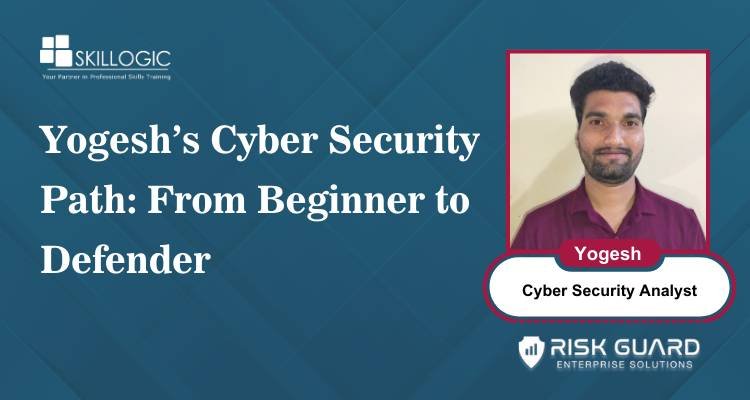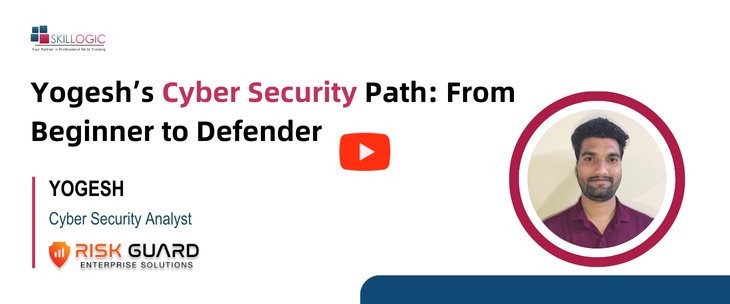Yogesh’s Cyber Security Path: From Beginner to Defender
Discover Yogesh’s inspiring cyber security journey from a complete beginner to a skilled defender. Learn how dedication, training, and hands-on practice can help you build a successful career in cyber security.

Yogesh’s journey into cyber security is an inspiring story of passion, persistence, and preparation. Coming from a computer science background, he developed an early interest in cryptography, networking, and system security during his engineering days. What started as curiosity in elective subjects soon turned into a clear career path when he decided to pursue specialized training.
With the guidance and practical-focused training from SKILLOGIC, along with an internship at Digit Defense, Yogesh built strong technical skills and industry readiness. The mock interviews, placement support, and hands-on exposure not only boosted his confidence but also helped him secure a Cyber Security Analyst role at RiskGuard Solutions as he stepped into the professional world of cyber defense.
Here, Yogesh shares his learning journey, training experience, interview preparation, and valuable advice for beginners aspiring to start a career in cyber security.
Yogesh’s Cyber Security Journey in His Own Words
Here in this section, Yogesh answers key questions about his education, training, internship experience, interview preparation, and career advice for aspiring cyber security professionals.
Q1: Can you introduce yourself and share your academic background?
My name is Yogesh, and I completed my Bachelor of Technology in Computer Science and Engineering at Vardhaman College of Engineering and Technology in 2023, graduating with a GPA of 7.17. During my studies, I developed a keen interest in subjects such as cryptography, network security, operating systems, and computer networks. Cyber Security was also offered as an elective subject in my degree, and that exposure helped me realize that I wanted to pursue a career in this field. I also completed my intermediate education at ATR College with a GPA of 8.3.
Q2: How did you get interested in cyber security?
During my bachelor’s program, I found myself more drawn toward cyber security and networking. I was fascinated by the concept of defending systems, understanding vulnerabilities, and learning cryptographic methods. That curiosity pushed me to dive deeper into the field. To strengthen my foundation, I decided to enroll in professional training at SKILLOGIC, where I got the right guidance and exposure to practical cyber security concepts.
Q3: What cyber security training did you take, and who were your mentors?
I opted for an offline cyber security course in Hyderabad, although the program initially began with one week of online classes led by trainers Fatima and Nitin. Once offline sessions started, my mentors included Surya Sir, Abdul Sir, and others who gave more emphasis to practical learning rather than just theory. They not only explained tools and techniques but also shared their knowledge on how to approach interviews in this domain.
Q4: How much time did you dedicate to learning outside of class?
The formal training sessions were two hours long, five days a week. However, my real learning happened after class. Every day, I dedicated five to six additional hours at home to practice what was taught. The trainers assigned daily tasks, which allowed me to revise and apply concepts practically. This consistent effort helped me strengthen my theoretical understanding while also building my hands-on skills.
Q5: How did you handle doubts and questions during your training?
The institute had a strong support system for students. There were dedicated doubt-clearing sessions conducted weekly, usually on Thursdays or Fridays, through online meetings. While most of my questions were resolved during offline sessions, whenever I faced deeper challenges, I reached out to trainers like Nitin and Fatima, who clarified everything patiently. This ensured I never felt stuck at any stage of my learning.
Q6: What was your experience during the internship?
My internship at Digit Defense gave me exposure to real-time projects. I worked on both host-based and local-based applications, testing them for vulnerabilities and weaknesses. I learned penetration testing in practical environments and even built security tools like keyloggers and traffic monitoring systems using Python. Since I already had coding knowledge from my bachelor’s program, I was able to apply those skills to cyber security, which added great value during my interviews.
Q7: How did mock interviews help you prepare for real interviews?
Mock interviews were a game-changer. They prepared me not only for technical questions but also for scenario-based problem solving, which is very common in cyber security interviews. Instead of asking definitions, the trainers focused on real-world issues, like what actions I would take if a system was under attack. These sessions also improved my communication skills and gave me the confidence to handle real interviews smoothly.
Q8: How supportive was the placement team at SKILLOGIC?
The placement team was extremely supportive and responsive. Coordinators like Harshita and Harini regularly shared job opportunities, scheduled interviews, and responded to my queries within hours. They also motivated me throughout the process, which was very reassuring. Unlike applying through LinkedIn, where resumes are shortlisted, SKILLOGIC directly connected us to interviews, which increased my chances significantly.
Q9: Can you share your interview experiences?
I attended multiple interviews through different platforms. One of the most memorable was with a US-based company in Hyderabad, where I cleared eight rigorous rounds. Unfortunately, they lost a project and couldn’t offer me the role. Later, through SKILLOGIC, I interviewed with RiskGuard Solutions. Initially, they had planned both a written test and a technical interview, but after evaluating my cyber security skills, they skipped the written round and focused only on technical discussions. The interview was mostly scenario-based and practical, focusing on tools like Nmap and Linux commands. I successfully secured my placement with them.
Q10: What advice do you have for beginners entering cyber security without coding skills?
Many people hesitate to enter cyber security because they think advanced coding knowledge is mandatory. That’s not true. As a beginner or fresher, coding is not a barrier. Instead, you should focus on networking, operating systems, Linux basics, vulnerability assessments, and practical defense skills. Over time, coding can be learned gradually, and it certainly helps in writing scripts or developing custom tools. But to start, curiosity, dedication, and foundational knowledge are more important than coding expertise.
Q11: What are your final thoughts about your cyber security journey so far?
My journey has been rewarding and full of learning opportunities. SKILLOGIC provided strong training, doubt-clearing support, mock interview preparation, and excellent placement assistance. I believe cyber security is a booming industry with immense opportunities, and I am glad I started my career in this field. For anyone aspiring to become a cyber defender, continuous learning is the key. Even after getting placed, one must stay updated with industry trends and evolving technologies to grow in this exciting career.
Refer these articles:
- From Fresher to SOC Analyst Yaseen's Inspiring Journey
- Anmol’s Journey to Landing an Associate System Engineer Role
- Swathi's Cyber Security Journey from Mechanical Engineering
Highlights from Yogesh’s Cyber Security Journey
With the right guidance and practical-focused training from SKILLOGIC, Yogesh transformed his passion for security into a professional career. Here are the key highlights of his journey:
- Hands-on Learning First: Practical training sessions and daily tasks helped him gain real-world problem-solving skills.
- Mentorship Matters: Trainers like Fatima, Nitin, Surya, and Abdul focused on practical knowledge, tools, and interview preparation.
- Internship Experience: At Digit Defense, he worked on vulnerability assessments, penetration testing, and even built tools using Python.
- Mock Interviews for Confidence: Regular practice interviews prepared him for scenario-based questions and improved his communication skills.
- Strong Placement Support: The SKILLOGIC placement team provided timely opportunities, quick responses, and direct interview scheduling.
- Facing Multiple Interviews: From clearing eight tough rounds with a US-based company to finally landing at RiskGuard Solutions, his persistence paid off.
- Cyber Security Without Coding: He believes beginners don’t need advanced coding skills initially; networking, Linux, and system basics are enough to start.
- Continuous Learning Mindset: Staying updated with evolving tools and trends is his mantra for long-term success in cyber security.
In short, Yogesh’s journey proves that with the right training, mentorship, and persistence, anyone can build a strong career in cyber security. His story is a reminder that passion, consistent practice, and continuous learning are the real keys to becoming a successful cyber defender.
Refer these articles:
- How much is the Cyber Security Course Fees in Bangalore
- How to Become a Cyber Security Expert in Bangalore
- How to Become a Cyber Security Expert in Mumbai
- Top Tips for Selecting the Best Cyber Security Institute in Mumbai
For anyone considering a career in cyber security, the opportunities have never been brighter. According to Fortune Business Insights, the global cyber security market is expected to reach USD 562.77 billion by 2032. Enrolling in a cyber security institute provides a strong foundation to enter this rapidly growing field, with structured programs and hands-on training tailored to industry needs.
This surge is also creating more opportunities in India, where the demand for skilled cyber security professionals is growing at a fast pace. To meet this need, leading institutes across major cities are offering classroom-based and offline courses that equip learners with practical, job-ready skills.
Whether you’re looking to start a career in cyber security or upgrade your skills for better roles, enrolling in a cyber security course in Bangalore is a smart move. Known as India’s Silicon Valley, Bangalore hosts top IT companies, global tech giants, startups, and research hubs, all creating a high demand for skilled cyber security professionals. With access to expert-led training, cutting-edge labs, and opportunities to work on real-world projects, Bangalore provides the perfect ecosystem to gain practical experience and fast-track your career in cyber security.
SKILLOGIC is a leading institute for cyber security training in India, recognized for equipping learners with practical, job-ready skills that match the evolving digital landscape. The offline cyber security course in Mumbai, Bangalore, Hyderabad, Chennai, Pune, Coimbatore, Ahmedabad, and other cities is built around hands-on labs, real-world simulations, and expert-led guidance to ensure strong industry readiness.
The Cyber Security Professional Plus Program, accredited by NASSCOM FutureSkills and IIFIS, is delivered by seasoned trainers with deep expertise in the field. Covering key areas like ethical hacking, penetration testing, vulnerability assessments, and network defense, the program is structured to provide both technical mastery and career confidence. Learners also gain from 24/7 cloud lab access, internships, globally recognized certifications, and dedicated placement assistance.
With over 1,00,000 professionals trained worldwide, SKILLOGIC has earned a strong reputation as a trusted destination for cyber security education. Whether you’re starting fresh or making a career shift, SKILLOGIC empowers learners with future-ready skills to thrive in today’s competitive cyber security industry.


0
131